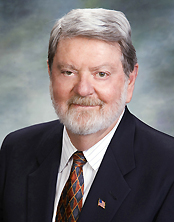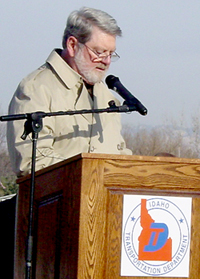
| CONNECTIONS |
IDAHO
ITD
HOME
511 TRAVEL SERVICES
IDAHO
DMV
ITD
NEWS
HIGHWAY
SAFETY
IDAHO STATE POLICE
STATE OF IDAHO
NIATT
NATIONAL
AASHTO
AAMVA
AAA of IDAHO
FEDERAL HIGHWAYS
FEDERAL AVIATION
IDAHO STATE POLICE
NHTSA
NTSB
TRB
U.S. DOT
TRANSPORTER
Archives
Milestones
Comments
Idaho
Transportation
Department
Office of Communications
P.O. Box 7129
Boise, ID 83707
208.334.8005
Fax: 208.334.8563

Transportation Board tenure satisfying,
but challenges remain for McClure's successors
Retirement from the transportation board and from Owyhee Construction Co. will enable McClure to travel more with wife Bev and to spend more time with his three grandchildren, Ashley, Zackary and Jenna. |
Monte McClure was in a familiar environment last week, returning to the Idaho Transportation Department’s Headquarters to complete employee exit papers. But the access badge hanging from his shirt pocket was different than he was accustomed to… It was a visitor’s badge checked out from the security desk.
McClure formally ended more than 13 years as a member of the Idaho Transportation Board last month. Officially, his second full term ended Jan. 30, but he remained on the board until Gov. C.L. “Butch” Otter announced the appointment of Jerry Whitehead (see related story) to represent District 3.
 Former Gov. Phil Batt appointed McClure to complete a 1 1⁄2 year term on the board in 1995 when the governing body was composed of just three members; each member represented two ITD administrative districts.
Former Gov. Phil Batt appointed McClure to complete a 1 1⁄2 year term on the board in 1995 when the governing body was composed of just three members; each member represented two ITD administrative districts.
Shortly after his appointment, the board expanded to seven members – one for each district and a board chairman.
When McClure agreed to the assignment, he was told it would require a commitment of one or two days per month. As it turned out, that was less than half the time he devoted to board meetings and other meetings in his district. And he never kept track of the telephone calls.
Gov. Batt asked McClure to apply his strong business sense to his new role at ITD and look for ways of streamlining the department.
The number of employees declined soon afterward, primarily through attrition. But Congressional approval of the federal transportation bill known as TEA-21 (Transportation Equity Act for the 21st Century) brought an expanded budget, new projects and a slight increase in the ranks of employees.
Times have become much leaner since then, McClure admits. Vehicle registration fees and the state gas tax revenue have not increased since 1997 and 1996 respectively. Dealing with declining revenue and inflation has become the most pressing job for board members.
“I believe the people of Idaho understand the department needs more money,” the retiring board member said. “We’re going to lose some of our investment if we don’t do something.” One option that board members don’t want to consider is allowing some less traveled roads to revert to gravel.
That’s not acceptable, McClure said. “But the day may be coming sooner than anyone thought.”
Funding challenges began to surface with the arrival of a new millennia. But momentum to increase transportation funding didn’t become a major concern for a few more years.
“We have been working hard on additional funding for four years and we still don’t have it.”
 McClure remains optimistic the federal government will continue to support the Highway Trust Fund when the present federal authorization expires in September. “I believe the federal government will step up and do what’s necessary,” he said.
McClure remains optimistic the federal government will continue to support the Highway Trust Fund when the present federal authorization expires in September. “I believe the federal government will step up and do what’s necessary,” he said.
But he doesn’t foresee any substantial growth.
Despite the recent funding challenges, McClure said he has had a rewarding tenure on the board.
“It’s been a very satisfying 13 1⁄2 years. But I’m enjoying not having to prepare for board meetings and all of the other meetings that I had to attend. But overall, it has been a very satisfying experience.”
One of his major accomplishments, building on his background in the construction industry, was to help forge a new relationship between ITD and the state’s many local road and highway jurisdictions. Working closely with the Local Highway Technical Assistance Council, ITD has created a statewide funding pool for projects.
That gives some small jurisdictions access to state funding for projects that would not have been possible with their limited allotments of federal funds. ITD now receives all of the federal funds and redistributes state funds for local projects. The local projects are not required to meet some of the federal standards, and they literally get more mileage out of the state funds.
McClure played an important role in the new approach, working closely with LHTAC advisory board members and the late Joe Haynes, LHTAC’s long-time administrator.
Retirement from the transportation board and from Owyhee Construction Co. will enable McClure to travel more with wife Bev and to spend more time with his three grandchildren, Ashley, Zackary and Jenna. He will continue as chief executive officer of Owyhee Construction, which now is operated by son Joe and daughter Molly.
The family-owned business specializes in municipal sewer and water systems, drainage and irrigation systems and land development.
“In a family-owned business, there’s really no formal retirement, you just kind of slow down,” he explains.
Published 4-3-9